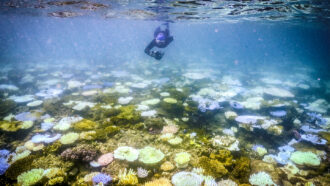Life

Educators and Parents, Sign Up for The Cheat Sheet
Weekly updates to help you use Science News Explores in the learning environment
Thank you for signing up!
There was a problem signing you up.
-
 Climate
ClimateMicrobes in the Arctic may be releasing more climate-warming gases
Mini greenhouses in the wild show how the tiny organisms lurking underground in a ‘sleepy biome’ could play a big role in climate change.
-
 Fossils
FossilsThis paleontologist studies ancient mammal movement — virtually
Anne Kort uses computers to piece together the fossils of ancient mammals. Studying fossils virtually offers her more ways to study fragile remains.
-
 Animals
AnimalsTiny treadmills reveal how fruit flies sprint
Forcing fruit flies to move shows how the insects coordinate their steps. This holds clues to other animals’ brains and movement.
-
 Animals
AnimalsCorals may have been the first life forms to glow in the dark
Ancestors of modern octocorals may have lit up the deep sea as far back as 540 million years ago.
By Jake Buehler -
 Animals
AnimalsHibernating bumblebee queens can survive days of watery submersion
Hibernating queen bumblebees survived accidental submersion, leading researchers to discover their surprising resilience to flooding.
-
 Animals
AnimalsScientists Say: Endotherm and Ectotherm
Endotherms use their own energy to maintain their internal temperature. Ectotherms use external heat sources to control their body temperature.
-
 Fossils
FossilsYoung fossil hunters discover rare teen T. rex
In public view, scientists at the Denver Museum of Nature and Science will prepare the fossil for display. Their work will take about a year.
By Skyler Ware -
 Animals
AnimalsBelugas can warp and wiggle their forehead fat like Jell-O
Molding and moving this ‘melon’ may help the whales communicate.
-
 Plants
PlantsGene editing may help rice better withstand climate change
Three genes may limit the ability of rice to handle dry or salty conditions. A Regeneron ISEF finalist shows that CRISPR could target and change them.
-
 Plants
PlantsFlowers may electrically detect bees buzzing nearby
The discovery may reveal how plants time nectar production and share information with neighboring blooms.
-
 Animals
AnimalsPhoenixes aren’t the only creatures to survive the flames
Although a phoenix that burns and lives is a myth, many living things on Earth don’t mind hot temperatures.
-
 Oceans
OceansThe seas’ record-breaking hot streak may bring unwelcome changes
Off-the-charts warming could fire up more hurricanes, intensify coral bleaching and accelerate the melting of Antarctic sea ice.
By Nikk Ogasa